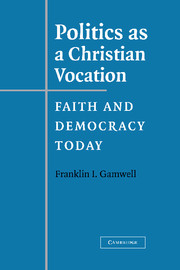Book contents
- Frontmatter
- Contents
- Preface
- Politics as a Christian Vocation
- Introduction: The Present Purpose
- 1 Render to Caesar
- 2 Government by the People
- 3 Faith and the Way of Reason
- 4 Justice in the Community of Love
- 5 Religious Decisions at Stake
- 6 Political Deliberations
- Appendix: On the Humanistic Commitment
- Works Cited
- Index
Appendix: On the Humanistic Commitment
Published online by Cambridge University Press: 18 February 2010
- Frontmatter
- Contents
- Preface
- Politics as a Christian Vocation
- Introduction: The Present Purpose
- 1 Render to Caesar
- 2 Government by the People
- 3 Faith and the Way of Reason
- 4 Justice in the Community of Love
- 5 Religious Decisions at Stake
- 6 Political Deliberations
- Appendix: On the Humanistic Commitment
- Works Cited
- Index
Summary
Government by the people, this work has argued, is politics through full and free discourse. Democracy, therefore, presupposes the humanistic commitment. It affirms that reason, “universal and yet individual to each,” is the “ultimate judge … to which all authority must bow” (Whitehead 1961: 162) – or that reasons authorized finally by common human experience are alone sufficient to validate any understanding that can be validated. Specifically, popular sovereignty depends on the possibility of assessing by argument the validity of religious claims and thus claims for ultimate terms of political assessment. But commitment to the way of reason, as I have called it, is today widely rejected, both by religious adherents and by those who purport to hold no such conviction at all. Throughout the extended diversity of our political community, one might even say, the exclusion of religious convictions from validation and invalidation through discourse is the one opinion about religion on which there is near consensus.
A similar view dominates academic discussion. Chapter 2 reviewed alternative accounts of a democratic constitution and noted especially those for which justice is independent of any conception of the comprehensive good. Typically, theories pursue that separation in order to affirm religious freedom notwithstanding their assumption that religious differences cannot themselves be adjudicated in public discourse. Quite apart from discussions of democracy, moreover, many thinkers hold that rationality is misconceived when taken to be the arbiter of claims for universal principles of belief or practice.
- Type
- Chapter
- Information
- Politics as a Christian VocationFaith and Democracy Today, pp. 165 - 172Publisher: Cambridge University PressPrint publication year: 2004



